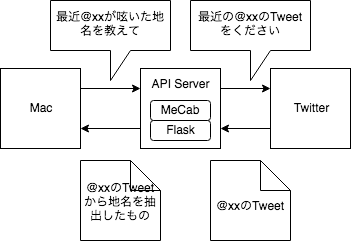この記事は3年以上前に書かれた記事で内容が古い可能性があります
flaskでAPIサーバを作成する
flaskでAPIサーバを作成してみる
今回は、TwitterIDから、最近呟いた地名を取得するAPIを作成する
MeCabなど環境作成はサクッとAmazon LinuxにMecab導入を参考にしてください

【APIサーバ】flask-corsをインストール
# pyenv versions system * 3.5.0 (set by /root/.python-version) # pip install requests requests_oauthlib # pip install flask-cors # pip freeze certifi==2018.1.18 chardet==3.0.4 click==6.7 Flask==0.12.2 Flask-Cors==3.0.3 idna==2.6 itsdangerous==0.24 Jinja2==2.10 MarkupSafe==1.0 mecab-python3==0.7 netifaces==0.10.6 oauthlib==2.0.6 requests==2.18.4 requests-oauthlib==0.8.0 six==1.11.0 urllib3==1.22 Werkzeug==0.14.1
【APIサーバ】各スクリプトの配置
最新版はこちら(https://github.com/yoshi-island/mecab-twitter-api)
「get_tweets_place_list.py」で、tweetを取得してMecabで地名を抽出、
「mecab-twitter-api.py」で、APIサーバとしてリクエストが来たら返信する
passwords.py
Twitter tokenは一応別ファイルに書いておいて、モジュールとして呼び出す。
Twetterの設定はこちらを参考に。
twitter botを作ってみた
passwords.py
oath_keys = {
"consumer_key": "",
"consumer_secret": "",
"access_token": "",
"access_token_secret": ""
}
get_tweets_place_list.py
get_tweets_place_list.py
#!/usr/bin/env python
# -*- coding:utf-8 -*-
# python 3.5.0
###################
# usage
###################
#
#user = "<tweetuser>"
#place_list_rank = get_tweets_place_list(user)
#
# passwords.py
# oath_keys = {
# "consumer_key": "",
# "consumer_secret": "",
# "access_token": "",
# "access_token_secret": ""
# }
###################
# import modules
###################
from requests_oauthlib import OAuth1Session
import json
import MeCab
import collections
import passwords
###################
# variables
###################
oath_keys = passwords.oath_keys
###################
# create oath session
###################
def session_create(oath_keys):
oath = OAuth1Session(
oath_keys["consumer_key"],
oath_keys["consumer_secret"],
oath_keys["access_token"],
oath_keys["access_token_secret"]
)
return oath
###################
# get tweets
###################
def get_tweets(user,oath):
user = user
url = "https://api.twitter.com/1.1/statuses/user_timeline.json?"
params = {
"screen_name": user,
"count": "1000"
}
oath = oath
responce = oath.get(url, params = params)
if responce.status_code != 200:
print("Error code: %d" %(responce.status_code))
return None
tweets = json.loads(responce.text)
#tweets_format = json.dumps(tweets, indent=4, separators=(',', ': '))
#print(tweets_format)
tweets_text_list = ""
for l in tweets:
tweets_text_list += l['text'] + "\n"
return tweets_text_list
###################
# mecab_analyze_tweets
###################
def mecab_analyze_tweets(tweets_text_list):
tweets_text_list = tweets_text_list.split("\n")
mecab = MeCab.Tagger("-Ochasen")
place_list = []
place_list_srctwt = []
for l in tweets_text_list:
if len(l) > 0:
mecab_parsed = mecab.parse(l)
items = mecab_parsed.split("\t")
if len(items)>4:
if items[3].find("地域") > -1:
if len(items[0]) > 1:
if items[0] != "日本":
place_list.append(items[0])
place_list_srctwt.append(l)
count_dict = collections.Counter(place_list)
place_list_rank = count_dict.most_common(10)
return place_list_rank,place_list_srctwt
###################
# main
###################
#if __name__ == "__main__":
def get_tweets_place_list(user):
oath = session_create(oath_keys)
tweets_text_list = get_tweets(user,oath) # list
place_list_rank,place_list_srctwt = mecab_analyze_tweets(tweets_text_list) # list
return place_list_rank, place_list_srctwt
mecab-twitter-api.py
mecab-twitter-api.py
#!/usr/bin/env python
# -*- coding:utf-8 -*-
# python 3.5.0
###################
# import modules
###################
import get_tweets_place_list
from flask import Flask, jsonify, abort, make_response
import netifaces
import json
from flask_cors import CORS, cross_origin
import ssl
###################
# get local address
###################
sv_ip = netifaces.ifaddresses('eth0')[netifaces.AF_INET][0]['addr']
###################
# api functions
###################
api = Flask(__name__)
CORS(api)
api.config['JSON_AS_ASCII'] = False # for Japanese language
context = ssl.SSLContext(ssl.PROTOCOL_TLSv1_2)
context.load_cert_chain('<cert path>', '<key path>')
@api.route('/getTweetsPlace/<string:userId>', methods=['GET'])
def get_user(userId):
user = userId
try:
place_list_rank, place_list_srctwt = get_tweets_place_list.get_tweets_place_list(user) # error judge
place_name = place_list_rank[0][0] # data existance judge
place_cnt = place_list_rank[0][1] # data existance judge
except:
return make_response(jsonify({'error': 'Not found'}), 404)
rank_list = [
{
"number": 1,
"place": place_name,
"count": place_cnt
}]
for i in range (2,6):
place_name = ""
place_cnt = ""
try:
place_name = place_list_rank[i][0]
place_cnt = place_list_rank[i][1]
component = {
"number": i,
"place": place_name,
"count": place_cnt
}
rank_list.append(component)
except:
break
result = {
"result":True,
"data":{
"userId":user,
"rank":rank_list,
"src_place_twt": place_list_srctwt
}
}
return make_response(jsonify(result))
@api.after_request
def after_request(response):
response.headers.add('Access-Control-Allow-Origin', '*')
response.headers.add('Access-Control-Allow-Headers', 'Content-Type,Authorization')
response.headers.add('Access-Control-Allow-Methods', 'GET,PUT,POST,DELETE,OPTIONS')
return response
@api.errorhandler(404)
def not_found(error):
return make_response(jsonify({'error': 'Not found'}), 404)
if __name__ == '__main__':
api.run(host=sv_ip, port=3000, ssl_context=context, threaded=True, debug=True)
【Mac】実行
ローカルMacから実行
今回はホリエモンのIDを利用
https://{API IP}:3000/getTweetsPlace/@{TwitterID}
きちんと返って来ている
% curl -k https://{API IP}:3000/getTweetsPlace/@takapon_jp
{
"data": {
"rank": [
{
"count": 1,
"number": 1,
"place": "押尾"
},
{
"count": 1,
"number": 2,
"place": "大阪"
},
{
"count": 1,
"number": 3,
"place": "藤沢"
},
{
"count": 1,
"number": 4,
"place": "心斎橋"
}
],
"src_place_twt": [
"エジプト古代人!",
"藤沢数希さん(@kazu_fujisawa)のぼく愛もそう…",
"押尾紗季プロ❣️",
"心斎橋駅から徒歩1分です!",
"大阪府 大阪市中央区 西心斎橋1-9-31 辻本ビル 4階"
],
"userId": "@takapon_jp"
},
"result": true
}
Trouble Shooting
以下のようなエラーが出たので
The 'Access-Control-Allow-Origin' header has a value 'null' that is not equal to the supplied origin. Origin 'null' is therefore not allowed access.
以下を参考に、「@api.after_request」を追加したら、解消した
https://stackoverflow.com/questions/22181384/javascript-no-access-control-allow-origin-header-is-present-on-the-requested
@api.after_request
def after_request(response):
response.headers.add('Access-Control-Allow-Origin', '*')
response.headers.add('Access-Control-Allow-Headers', 'Content-Type,Authorization')
response.headers.add('Access-Control-Allow-Methods', 'GET,PUT,POST,DELETE,OPTIONS')
return response




